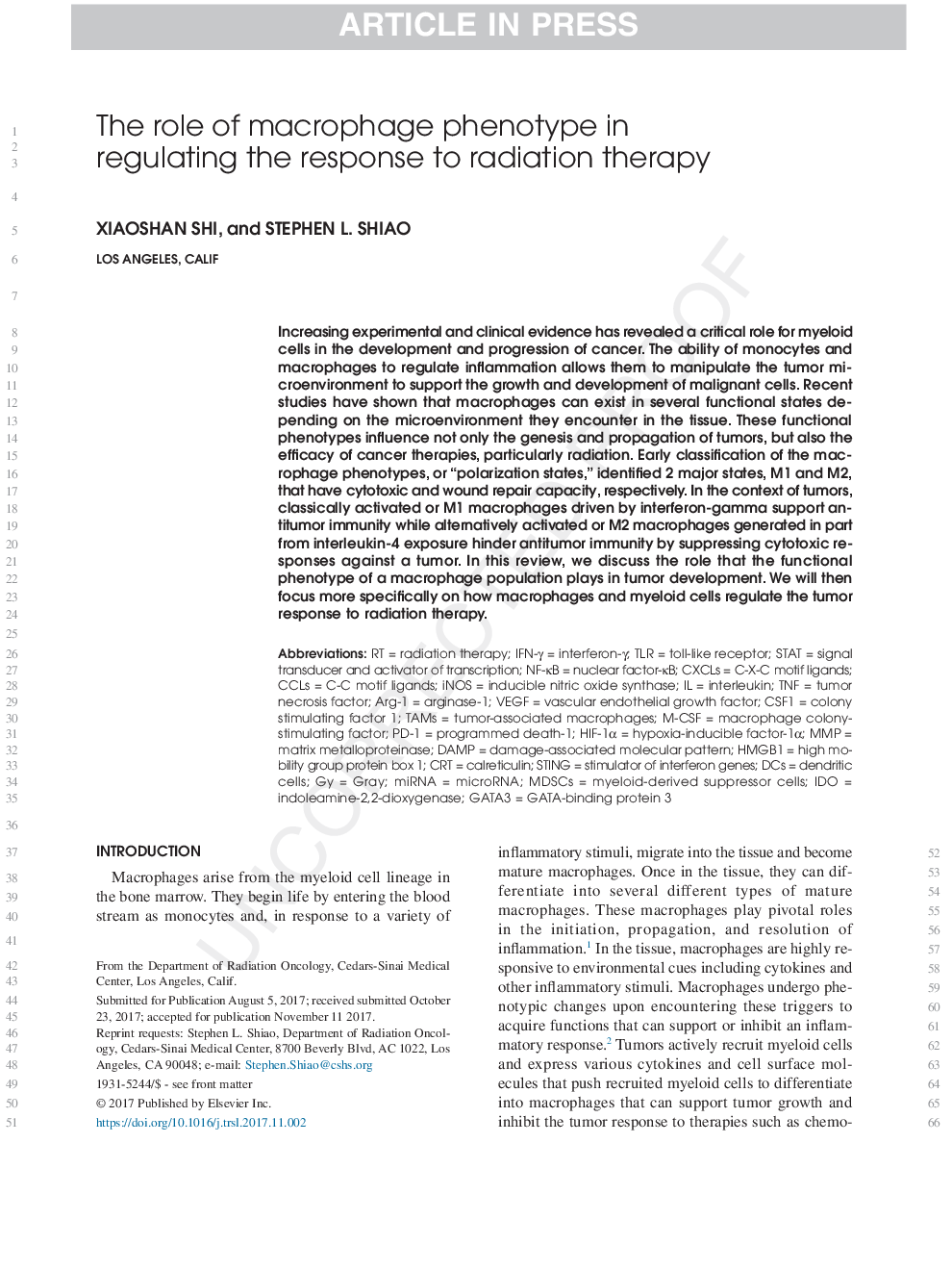| کد مقاله | کد نشریه | سال انتشار | مقاله انگلیسی | نسخه تمام متن |
|---|---|---|---|---|
| 8769032 | 1597919 | 2018 | 17 صفحه PDF | دانلود رایگان |
عنوان انگلیسی مقاله ISI
The role of macrophage phenotype in regulating the response to radiation therapy
ترجمه فارسی عنوان
نقش فنوتیپ ماکروفاژ در تنظیم پاسخ به پرتودرمانی
دانلود مقاله + سفارش ترجمه
دانلود مقاله ISI انگلیسی
رایگان برای ایرانیان
کلمات کلیدی
DAMPNF-κBHMGB1TLRDCsHIF-1αIFN-γCCLSIDOiNOSGATA3MDSCsCrtM-CSFPD-1CSF1TAMsARG-1TNFMMPGATA-binding protein 3Arginase-1 - آرژنین 1STAT - آمارdamage-associated molecular pattern - الگوی مولکولی مرتبط با آسیبinterferon-γ - اینترفرون-γinterleukin - اینترلوکینToll-like receptor - تیالآرGray - خاکستریDendritic cells - سلول های دندریتیکMyeloid-derived suppressor cells - سلول های سرکوبگر مشتق از میلوئیدinducible nitric oxide synthase - سنتاز اکسید نیتریک القاییhypoxia-inducible factor-1α - عامل القاء شده با هیپوکسی 1αVascular endothelial growth factor - فاکتور رشد اندوتلیال عروقیVascular Endothelial Growth Factor (VEGF) - فاکتور رشد اندوتلیال عروقی (VEGF)tumor necrosis factor - فاکتور نکروز تومورnuclear factor-κB - فاکتور هسته ای κBmatrix metalloproteinase - ماتریکس متالوپروتئینازmacrophage colony-stimulating factor - ماکروفاژ عامل کلونی تحریک کنندهTumor-associated macrophages - ماکروفاژهای مربوط به تومورSignal transducer and activator of transcription - مبدل سیگنال و فعال کننده رونویسیstimulator of interferon genes - محرک ژن های اینترفرونProgrammed death-1 - مرگ برنامه ریزی شده 1colony stimulating factor 1 - مستعد تحریک کلنی 1MicroRNA - میکرو RNA MiRNA - میکروRNA، ریزآرانای، miRNASTING - نیشRadiation therapy - پرتودرمانی یا رادیوتراپیcalreticulin - کلرتی کولین
موضوعات مرتبط
علوم پزشکی و سلامت
پزشکی و دندانپزشکی
پزشکی و دندانپزشکی (عمومی)
چکیده انگلیسی
Increasing experimental and clinical evidence has revealed a critical role for myeloid cells in the development and progression of cancer. The ability of monocytes and macrophages to regulate inflammation allows them to manipulate the tumor microenvironment to support the growth and development of malignant cells. Recent studies have shown that macrophages can exist in several functional states depending on the microenvironment they encounter in the tissue. These functional phenotypes influence not only the genesis and propagation of tumors, but also the efficacy of cancer therapies, particularly radiation. Early classification of the macrophage phenotypes, or “polarization states,” identified 2 major states, M1 and M2, that have cytotoxic and wound repair capacity, respectively. In the context of tumors, classically activated or M1 macrophages driven by interferon-gamma support antitumor immunity while alternatively activated or M2 macrophages generated in part from interleukin-4 exposure hinder antitumor immunity by suppressing cytotoxic responses against a tumor. In this review, we discuss the role that the functional phenotype of a macrophage population plays in tumor development. We will then focus specifically on how macrophages and myeloid cells regulate the tumor response to radiation therapy.
ناشر
Database: Elsevier - ScienceDirect (ساینس دایرکت)
Journal: Translational Research - Volume 191, January 2018, Pages 64-80
Journal: Translational Research - Volume 191, January 2018, Pages 64-80
نویسندگان
Xiaoshan Shi, Stephen L. Shiao,
